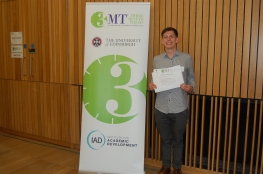Guest Blog Post from Owen Gwydion James, winner of the UK 3 Minute Thesis Competition.

Uber driver: You said you’re doing a PhD? What are you working on?
Me: …what’s our ETA?
Uber driver: 3 minutes.
Me: Well pal, strap in.
It might seem like an odd place to begin, but it’s a daily question that should be straightforward to answer, and yet can be tricky to get right. How do you give a stranger with an unknown scientific background a quick overview of what your PhD is about? Sure, you could take the easy route and give a short and simple answer (for me, “Neuroscience”), but this doesn’t give your new friend much to go on, and does a disservice to you and that huge beast of a project that major part of your life. The answer? Take part in the 3 Minute Thesis competition.
180 seconds seems like a phenomenally short amount of time to unload the details of your project on to someone—without sounding like you’re giving the rules and regulations on a radio advert. But taking part in the 3MT competition forces you to step away from the details of that day’s experiment and consider why you’re doing what you’re doing. What does it mean to you? What impact does your work have in the wider scheme of things? And hopefully, after some tentative introspection (and no small amount of edits), you’re left with some snappy sentences that come in handy for all situations—whether you’re talking to friends and family, a scientific audience, or the occasional Uber driver.
This type of communication has become as important to get right as all the publications, meetings and presentations that make up the bulk of academic life. In my lab, we regularly have visits from people with different neurological and neurodegenerative disorders, and their families, coming in to see what we do. Being able to communicate what our research is about, and what we are hoping to achieve with regards to understanding disease mechanism and identifying new drugs, is something I take great pride in. More and more, the academic community is reaching out to the general public to help educate people on science, health, technology—you name it! It boosts the public perception of scientists and enables more informed conversations that ultimately lead to evidence-based choices and change. Being able to talk casually about your research—without jargon—is an important step towards this, and who doesn’t like talking about their PhD anyway?
The 3MT
I first became interested in the 3MT when I saw a previous student in my lab, Chen Zhao, win the Edinburgh University final three years ago. I was blown away. Here were 9 students, with very different projects, giving the slickest presentations that I had seen at PhD level. They were engaging, inspiring, clever and funny, and it was great to see how passionately and efficiently they talked about their research.
Coming up with a hook is helpful; a nice analogy that your audience can relate to. I was lucky enough to get feedback from my friends and lab mates to home in on this, and I even managed to get a (very small) joke in, which was a bit of fun. Training from the University after the college round helped a lot too; getting taught how to make eye contact with a crowd and the importance of slowing down to make a point. It’s a performance! And honestly, your nerves will stop jangling after the first time you do it.
Unfortunately, practise really does make perfect and I feel pretty bad for my girlfriend. She helped me a lot and after the number of times I went over it at home, her party trick is now performing my 3MT word for word! But all this work meant that I grew in confidence each time I did it and I ended up really enjoying each presentation.
Should you do it?
Definitely. I’ve learnt so much from competing in the 3MT. It has been one of the best experiences I’ve had during my PhD and it’s opened the door to more opportunities too. Since winning the final, I was invited to the University of Edinburgh Chancellor’s dinner at Holyrood Palace, where I got to meet the Princess Royal and the University principal. I was also asked to present my 3MT there, which was an amazing experience. A friend of mine even used my 3MT video as a teaching tool in her high school biology class! Next, I’m looking forward to getting stuck into some fun new public engagement events with the generous prize money from UKRI—watch this space!
I would thoroughly recommend taking part. And even if you just go to watch, it’s a great cross-disciplinary event with a level of diversity in the talk topics that is rare to find. It’s brought me closer to my project and helped immensely with my public speaking.
Find out more about the 3 Minute Thesis Competition here

